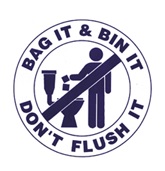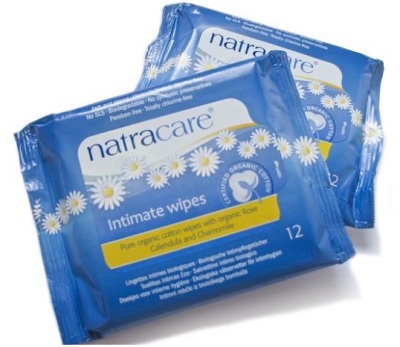Are We Wasting Our Time (and Money) Buying Biodegradable Products?
This morning a sample pack of Natracare Intimate Wipes dropped on to my desk for review. And as much as we like the product, when we started looking into its disposal we began a journey that has led to an interesting (to say the least) and mildly worrying 'end'.
The Natracare Intimate Wipes, like many feminine hygiene products, are often flushed down the toilet regardless of the advice and warnings given on the packets. And we would like to point out that Natracare clearly show on their packets that these items should not be flushed. However the Natracare wipes are biodegradable.
Water UK clearly state on their website that "No matter what it says on the packaging, most of our personal healthcare and beauty products must never be disposed of down the toilet... 
Water UK are also running a Bag It & Bin It Campaign to highlight the issue of what should or should not be flushed down the toilet.
Since our local council did not return our call, we spoke to Croydon Council in the Greater London area and we were given the same response as Water UK regarding disposal of these items. We were advised that, if we chose, these products could be put on our compost heap if we wanted to dispose of them ourselves, otherwise we should put them into a black bag for collection, to go to landfill.
Taking into account the number of women of child-bearing age in the UK who are menstruating on a monthly basis, if we all decided to 'compost' our sanitary products in the back garden I have a sneaking suspicion it may cause some deep discussion somewhere within the Government... So we are back to landfill sites again.
If we pop these products in the bin, what then? According to a major manufacturer of black bin liners, the majority are made from polythene - and as they told us - polythene does not degrade. Therefore anything inside the black bin liner will also not degrade, and simply sit encased in polythene under the ground, unless the bag gets ripped open.
However... if we all used black bin liners made from biodegradable products, this would go a very long way to combat this issue. We spoke to Polybags UK regarding this issue and they directed us to their biodegradable bags that completely disintegrate into carbon dioxide, water and biomass within 10-12 weeks, in standard composting condition.
Unfortunately we also discovered that the raw materials for making these bags is often more expensive than the polythene for the less eco-friendly bags and this results in a higher retail price. 
Which brings us to the original question of "Are We Wasting Our Time (and Money) Buying Biodegradable Products?"
Well, if we put them into a polythene bag for collection and they are sealed in this on a landfill site, then the answer has to be 'Yes'. What is the point of buying these items, usually at a higher cost, if they are never going to get the chance to biodegrade?
On the other hand, and as Madeleine Graham from Natracare so rightly pointed out, perhaps if the government are not acting enough on this then we, as individuals, can do our best to make sure we do : -
"As a company we [(Natracare] have done as much as we can to lessen our environmental impact and it becomes a consumer waste issue at the point of disposal... one that we as a society are seemingly ill equipped to deal with. The good of our products being as they are, in terms of waste disposal, will have their greatest effect with other lifestyle changes, e.g. throwing rubbish away in a bio-plastic black bag to increase the rate of biodegradation. It would still contribute less damage in land-fill cumulatively (e.g. less methane produced) in comparison to a plastic counterpart (40 billion biodegradable pads in landfill sounds better than 40 billion plastic ones) and reduce the overall toxicity of waste sites. All products not used in a menstrually specific context - say our wipes and liners - could safely be put into food waste bins, green waste bins or composted more happily than say a pad or tampon."
Another option would be to make the raw materials for biodegradable bin liner cost effective and ban the use of the polythene bag from landfill completely. Failing that, and, if we cannot persuade the women that can use it to move over to the Femmecup, maybe someone will invent something similar to a 'dog loo' that can be fitted into the bathroom and used to break down and dispose of these hygiene products in a safe and environmental way.
In the meantime, we can keep buying biodegradable products - we just need to think about their disposal.